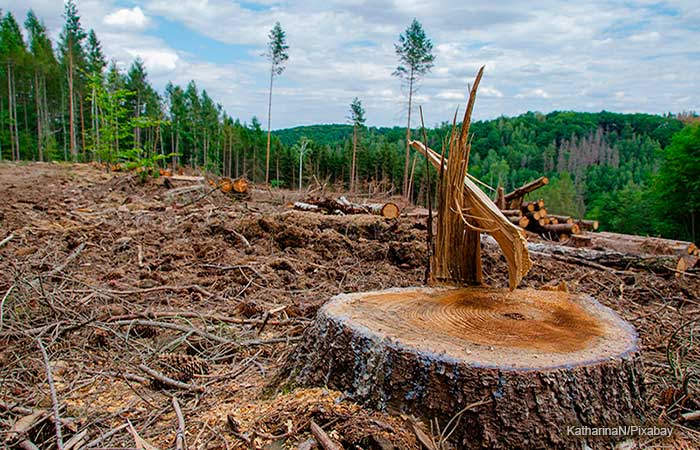FAQs about Deforestation of Forest

6. How does deforestation affect habitats and ecosystems?
Biodiversity loss has been defined as the decrease or disappearance of the variety of living beings that inhabit the planet, their different levels of biological organization and their respective genetic variability, as well as the natural patterns present in ecosystems. The UN has warned that a total of close to eight million species are in danger of extinction. Some researchers have even warned that we could be in the sixth mass extinction process in the history of the Earth.
Habitat destruction is the process by which a natural environment is transformed into a medium incapable of supporting the original species. Plants and animals are forced to migrate as a result of deforestation and land use change
It has been estimated that 70% of plant and animal species live in forest habitats. Due to this, deforestation is the main cause of the rapid disappearance of habitats and ecosystems, with direct loss of millions of species that live in tropical jungles and forests.
To reflect: the drama of the orangutan and the loss of its habitat
A case to easily understand the decrease in biodiversity due to deforestation is that of the orangutan, since this primate only lives in two places on Earth: Borneo and Sumatra.
The orangutan has a life expectancy of 30 years, the same period in which the great deforestation of Borneo occurred. In three decades these groups of primates saw the disappearance of the forests that had served as shelter and food for their ancestors for millions of years. With the felling of trees and the subsequent intensive burning of forests, Borneo became hell for orangutans. Disoriented, without a home or food, they fled to agricultural areas, seeking to subsist on the fruits of the oil palms, to which they were already adapting. But instead of finding the sustenance they were looking for, they found themselves face to face with the firearms of the humans, who considered them invaders and pests for coming to steal their crops. They shot them down with their rifles in an asymmetrical, cruel, and inhuman slaughter, which should be considered a crime against nature.
In August 2006, the Wildlife Conservation Society (WCS) through its program in Indonesia, one of the three countries that make up Borneo, stated that the orangutan population in that country was 20,000 animals, against 35,000 than there was in 1996. In other words, 10,000 orangutans were lost, the equivalent of 30% in just a decade.
Due to its low reproductive rate, some environmental groups have warned that the red primate could become extinct in the wild if urgent conservation measures are not taken.
FAQs about Deforestation of Forest
1. What is deforestation, what are its causes or objectives and consequences?
2. What is a primary forest and what percentage do they represent on the planet?
3. How are deforestation and water scarcity related?
4. What is the relationship between deforestation, drought, and forest fires?
5. What is the relationship between deforestation and global warming?
6. How does deforestation affect habitats and ecosystems?
7. What is the importance of the Amazon rainforest for South America?
8. What are the dangers that threaten the Amazon rainforest?
9. Why is deforestation in the Borneo rainforest considered an ecological catastrophe?
